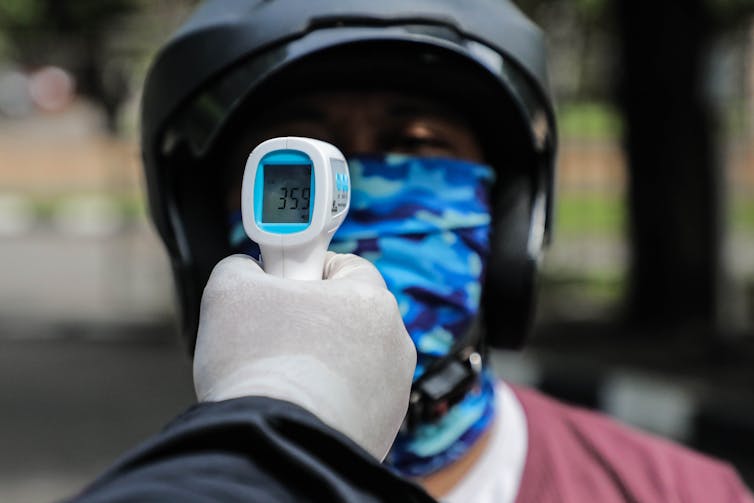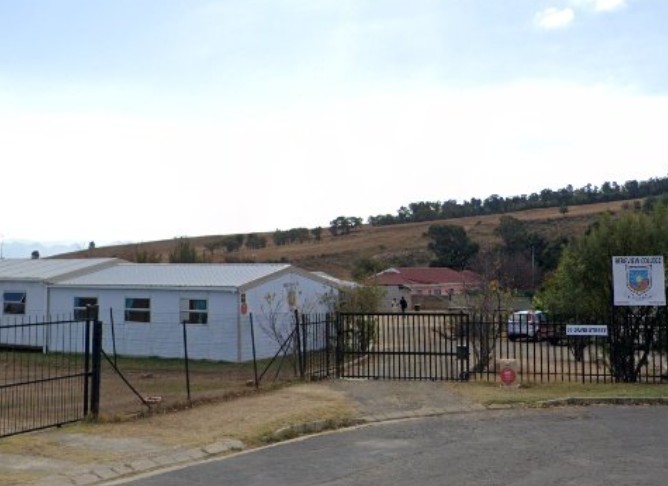- home Home
- keyboard_arrow_right Uncategorized
- keyboard_arrow_right Posts
- keyboard_arrow_rightSo you think investing in fever screening can curb the spread of COVID-19? Think again
So you think investing in fever screening can curb the spread of COVID-19? Think again
By: Andrea Fuller, University of the Witwatersrand and Duncan Mitchell, University of the Witwatersrand

Risa Krisadhi/SOPA Images/LightRocket via Getty Images
As lockdowns are lifted, procedures are being put in place to reduce the spread of COVID-19. Along with physical distancing, hand sanitisation and wearing of masks, fever screening is increasingly being set up as a requirement before entry is allowed into hospitals, shops, workplaces and schools. But there are physiological and clinical reasons why fever screening simply won’t work.
Andrea Fuller and Duncan Mitchell explain why fever screening is unlikely to reduce the spread of the virus. Their arguments are based on an understanding of the physiology of fever, body temperature measurement, and fever prevalence in people who transmit COVID-19.
What happens to your body when you have a fever?
Fever is a temporary elevation of body core temperature. It is part of a defensive response to infection by a virus.
When you develop a fever, you feel cold, heat generation in your body increases (achieved by shivering) and heat loss decreases (achieved by seeking warmth, covering up and reducing the flow of warm blood to the skin). When a fever breaks, either naturally or because you have taken an antipyretic like paracetamol, you feel warm. Your reactions include increasing the flow of warm blood to the skin and sweating, which helps to bring the body’s core temperature back to normal.
What are the limitations to infrared thermometers or thermal cameras detecting fevers?
Detecting fever requires measuring body core temperature. To do that accurately, you need to put a thermometer into the body core. Temperature in the rectum and the mouth get close to body core temperature.
Needing to measure body core temperature raises the first problem with fever screening. Thermal cameras and infrared thermometers measure heat radiating from a surface – in other words surface temperature. They don’t measure body core temperature.
Measuring surface temperature has contributed usefully to healthcare and to biology. For example, infrared cameras have shown whether skin grafts are receiving blood. On the biology front they have shown that toucans dump body heat through their bills.
But the forehead skin or inner eye temperatures that infrared thermometers or thermal cameras usually measure in fever screening are not body core temperatures.
Human surface temperature is heavily influenced by environmental conditions. In cool environments, surface temperatures can be much lower than body core temperature. And doing exercise, or being exposed to the sun, can raise the temperature on our foreheads above body core temperature. Thermal cameras screen for high skin temperature. They can and do find high face temperatures that have nothing to do with infections. Those “false positives” waste time and money in unnecessary follow-up.
Another problem is that skin temperature does not rise during the developing phase of a fever. It falls, because warm blood is kept away from the skin. So your skin temperature changes in the opposite direction to your body core temperature.
Thermal cameras would declare you safe, because your skin temperature is low, but you could be in the most infectious phase of the fever. No surface temperature is a reliable indicator of fever.
Could better fever screening detect COVID-19?
Even if infrared thermometers could detect fever reliably, they could not detect COVID-19 reliably. Nor could any other thermometer. Patients with COVID-19 are not guaranteed to have a fever.
Recent research indicates that many people who test positive for COVID-19, and especially children, never have any detectable sign of illness, including fever.
Even people who later do show symptoms will not have a fever during COVID-19’s incubation phase, which can last nearly two weeks. During this period, when they are asymptomatic, they can spread the virus. The finding that infected people without symptoms shed virus is the Achilles’ heel of controlling the current pandemic.
To add to the problem, not all patients with symptoms will have a fever, at least on the basis of once-off measurement. Only 31% of patients presenting at New York State hospitals with COVID-19 had fevers.
So, in addition to not measuring body core temperature well, infrared thermometers are being used to find a high temperature that many people exposed to COVID-19 won’t have.
Has fever screening ever helped to prevent the spread of viruses?
Thermal cameras were introduced at airports at the outbreak of the 2002/3 Severe Acute Respiratory Syndrome (SARS) pandemic. They were widespread in airports during the 2009 Influenza A (H1N1) pandemic. But for medical and technological reasons they have failed to prevent the import of any virus causing respiratory disease. They have failed even in combination with other interventions like follow-up contact and health declaration questionnaires. For example, 930 people who presented as potentially infected candidates were picked out by thermal screening from over 9 million passengers entering Japan in 2009/2010. But not one case of H1N1 influenza was diagnosed.
The data from Ebola shows the same pattern. Not one case of Ebola virus infection was picked up in 166,242 airport passengers screened when entering and leaving Sierra Leone in the 2014/2016 outbreak.
In the case of COVID-19, CNN has reported that no cases were detected among the more than 30,000 passengers screened with thermal cameras at US airports by mid-February 2020 .
Some scientists have been forthright about the dubious value of fever screening, arguing that border screening for infectious diseases should not be continued.
Is there any place for fever screening?
Perhaps, there may be benefits.
Some people with viral infections who know they are sick attempt to conceal their illness. Travellers wanting to fly home are prone to do so. Others take antipyretic drugs, hoping to avoid triggering thermal cameras.
Though there still is no scientific evidence, researchers have suggested that the prospect of being caught by fever screening is a deterrent to such dishonesty.
But we do not believe that the potential benefit outweighs the negatives. Apart from fever screening being unreliable, infrared thermometry poses a risk to thermometer operators who are required to come up close to potentially infected persons. Successfully passing a fever screen can create a false sense of security. And the thermal cameras used for mass screening are costly. So are the personnel required for any fever screening.![]()
Andrea Fuller, Professor, School of Physiology; Director, Brain Function Research Group, University of the Witwatersrand and Duncan Mitchell, Adjunct Professor in the School of Human Sciences, University of Western Australia, and Honorary Professorial Research Fellow, University of the Witwatersrand
This article is republished from The Conversation under a Creative Commons license. Read the original article.
Written by: Natasha
Similar posts
MORE ARTICLES
QUICK LINKS
UpComing Shows

959 Music Weekdays
Kaya 959 Hits
Real. Familiar. Memorable. Kaya 959 brings you the music you know and love from our playlist. Uninterrupted. Thursdays 20h00 to 21h00
close
The Best T in the City
With T Bose
He has held it down in the world of mid-morning radio with the best music, riveting topics, brilliant mixes and interesting guests. Every weekday, The Best T proves why he is the BEST by connecting to you like only your bro or favourite uncle could. He lets his listeners dictate the songs they want to hear in the ever-popular Top 10 at 10, and his Three Teaspoons never run out. Catch The Best T in the City Mondays to Fridays from 09h00 to 12h00.
close
Feel Good
With Andy Maqondwana
Feel good about feeling good! That's exactly what The Feel-Good show is about. An escape from the negativity that surrounds us, indulging you in good feels. Pass it on to one and all. Spread the good feeling around Gauteng with Andy Maqondwana.
close
Kaya Biz
With Gugulethu Mfuphi
The world of business is simplified for you by Kaya Biz with Gugulethu Mfuphi. This fast-paced award-winning business show talks to the corporate giants as well as up and coming entrepreneurs about their wins and challenges. Gugulethu invites guests to offer their analyses of markets and economies, and also delves into issues of personal financial wellness. Kaya Biz airs Mondays to Thursdays 18h00 to 19h00.
close
Point of View
With Phemelo Motene
Point of View with Phemelo Motene delves into the day’s current affairs, touches on real issues that affect people’s daily lives and shares expert advice on questions posed by the audience. Mondays to Thursdays 20:00 to 22:00.
closeConnect with Kaya 959
DownLoad Our Mobile App
© 2024 Kaya 959 | On The Street On The Air














